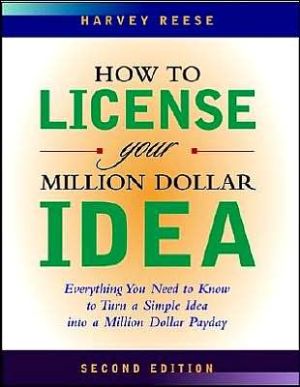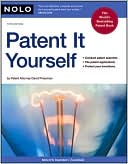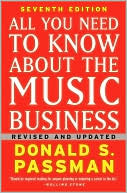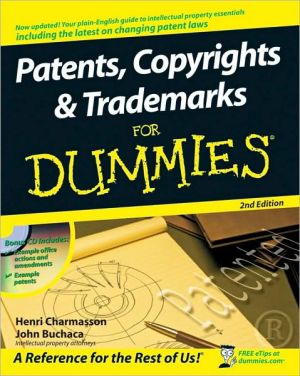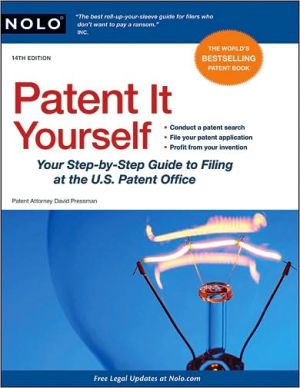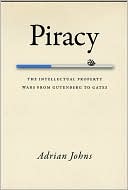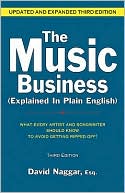How to License Your Million Dollar Idea: Everything You Need To Know To Turn a Simple Idea into a Million Dollar Payday
TURN YOUR GREAT IDEA INTO A GREAT BIG FORTUNE...\ We all have great ideas, and every day, ordinary people turn their simple, clever ideas into products or services that earn them millions in royalties. So what separates those who earn money exploiting their ideas from those who don t? The answer is in your hands; this book gives you all the information and all the motivation you need to turn your ideas into money without investment or financial risk.\ In How to License Your Million Dollar...
Search in google:
TURN YOUR GREAT IDEA INTO A GREAT BIG FORTUNE... We all have great ideas, and every day, ordinary people turn their simple, clever ideas into products or services that earn them millions in royalties. So what separates those who earn money exploiting their ideas from those who don t? The answer is in your hands; this book gives you all the information and all the motivation you need to turn your ideas into money without investment or financial risk. In How to License Your Million Dollar Idea, Second Edition, Harvey Reese, a successful new product developer, consultant, and licensing agent, reveals his system for creating commercially profitable ideas and his secrets for turning them into lucrative licensing agreements. Not only will you find nuts-and-bolts information on the licensing process, you ll also learn how to formulate an idea and find the motivation to grow that idea into a fortune. Totally revised and updated, this Second Edition covers recent changes in patent law and how the Internet has impacted modern licensing. Reese includes his proven step-by-step process for formulating an idea that manufacturers are willing to pay for, researching its authenticity, obtaining patents, finding prospects, negotiating the deal, and beyond. Filled with examples of successful, well-known licensing ventures, How to License Your Million Dollar Idea, Second Edition also features an expanded appendix of sample patent forms, licensing agreements, disclosure statements, publications, contact information, and more.
How to License Your Million Dollar Idea\ Everything You Need To Know To Turn a Simple Idea into a Million Dollar Payday \ \ By Harvey Reese \ John Wiley & Sons\ ISBN: 0-471-20401-3 \ \ \ Introduction\ Money can't buy happiness, but it will get you a better class of memories. -Ronald Reagan \ This is a test. What do the following phrases have in common?\ It takes money to make money.\ The bigger the risk, the bigger the profit.\ Go for the burn. No pain, no gain.\ The answer: They are all false. Physical therapists tell us that smart exercising needn't cause pain to be beneficial. And I can testify that you don't have to put your savings at risk to turn a handsome profit.\ In 1933, during the Great Depression, Charles Darrow, an out-of-work plumber of Allentown, Pennsylvania, found himself with plenty of time on his hands. Just to be doing something, he dreamed up a game about Atlantic City real estate and called it Monopoly. He licensed the rights to Parker Brothers, the big game company, and never had to work another day in his life. That was more than a half century ago, and the royalty checks are still coming in to his heirs. His total investment was some time, ingenuity, and brain power-investment assets that we all possess. If you have the will to put them to use, this book will show you how to enjoy a return on your investment that may potentially exceed your wildest dreams.\ SOLID GOLD POUND PUPPIES\ The business section of anybookstore is loaded with books that show you how to spend your money. You can become a Wall Street tycoon, you can invest in pork bellies, you can be a real estate mogul, or you can buy a franchise and be a donut shop operator. You name it-just ante up your money and take your best shot. Go for the burn ... and getting burned may be exactly what will happen.\ Having a good product idea is only a small part of what it takes to make a business work, and most businesses are gone by the third year, leaving the owner hopelessly in debt. Yes, certainly, yours might be one of the successful ones, but are you willing to bet your house and your children's education on it?\ On the other hand, manufacturers pay billions of dollars each year in royalties and licensing fees to people who supply them with profitable product ideas. Incredible fortunes are being made every day by ordinary people who have licensed their valuable inventions and new products to willing takers. Some years ago, a factory worker at a Ford plant near Cincinnati came up with a toy idea called Pound Puppies, which started out as a gift he made for his wife. But he was smart enough to recognize its sales potential and smart enough to realize that he should turn it over to professionals who know what they're doing. So he licensed his idea to what was then the Tonka Company. They sold more than 50 million puppies, and the royalties turned Mike Bowling, the ex-factory worker, into a multimillionaire. Stories like this are commonplace. Ordinary people are reaching for and achieving the biggest jackpots of their lives through licensing. The nice thing is that you can do it, too.\ Few ideas are totally original, however, and whatever you dream up, chances are that others have thought of the same thing. The trick is for you to be the one to act on it. And later, when the finished product is on the market, let the others be the ones to cry, "Hey! I had that idea years ago!" I call it Slacker's Remorse-or as Sophocles said centuries ago, "Success is not on the side of the faint hearted."\ THE HOW-TO-NOT-GO-INTO-BUSINESS-FOR-YOURSELF BOOK\ The purpose of this book is to show you how to make your fortune without risking one. If you'll supply the will, I can supply the knowledge. And you can keep your money in the bank. I'm billing this as the How-to-Not-Go-into-Business-for-Yourself book. The trick is to have other people spend their money and take the risk. If you have an exciting, new idea that can turn a profit, company presidents all over would love to hear from you, and it would be their pleasure to give you a cut of the proceeds. Any president would be delighted to give you $50.00 for every $1,000 in receipts you can create for his company. It's simply good business.\ Licensing is an equal opportunity activity. Good ideas can come from anyone, with or without connections. If it can earn a profit, the manufacturer doesn't care if you're young or old, rich or poor, male or female, black, white, or in between. He doesn't care if the idea comes from Mother Theresa or Attila the Hun. If your idea is a money maker, you will be welcome. To paraphrase a famous quote, except for sheer stupidity, there is nothing that can hold back the impact of a great idea. You can call successful business people lots of names, but "stupid" usually isn't one of them.\ TAKE THE MONEY AND RUN\ You can earn big money fast through licensing because that's what it is all about. If your idea is really good and you put it in the right hands, there's no upper limit to your profit potential. And if you've licensed your idea to a successful, professional marketing company, you'll probably be getting royalty checks while the inventor who wants to do it herself is still looking for funding. For some people, looking for enough capital to start a new business is a lifetime quest. And if they finally do collect the money, the statistical chance of success is very grim. The other way is to turn your idea over to professionals-people who know what they're doing-and then take the money and run. In the movie Patton, George C. Scott, who plays General Patton, explains to his troops that war isn't about dying for one's country; it's about getting the other guy to die for his country. Well, licensing isn't about investing your money. It's about getting the other guy to invest his. Let him have the risk and the glory. You'll take the royalty checks.\ Perhaps one day, one of your ideas will make you a millionaire. But in the meantime, you keep your job, you keep your cash, you keep your house, and you don't get nasty calls from creditors or your bank.\ IS YOUR IDEA IN A COMA?\ At one time or another, almost everyone has had a clever idea just pop into her head. It just stays there, without nourishment or attention, until it finally slips into a coma. Like Sleeping Beauty, this lovely idea just lies there, day after day, waiting for a Prince Charming to come along. Unfortunately, life's not a fairy tale, and the prince will never show up. What does happen is that eventually this person sees "her idea" on the market and hollers "Foul!" because someone beat her to it.\ If you're not prepared to act on your ideas, someone is always going to beat you to it. That's what capitalism is all about. Benjamin Disraeli, the nineteenth-century British statesman, said, "Success is the child of audacity." Lots of people get the same idea. The one who does something about it gets the prize, and the others get to complain about having bad luck. Properly exploiting just one useful idea may change your life forever-it happens all the time, and I have a system to help you do it effectively. It's called the C.R.A.S.H. course, and this book is going to carefully lead you through it. You won't be the same when you're finished.\ So many readers of this book's first edition have told me how it changed their lives that I have hope and confidence that this new edition will do the same for you.\ As Walt Disney said, if you can dream it, you can do it.\ CONVERTING YOUR BRAIN INTO AN IDEA FACTORY\ Actually, as I'm sure you know, ideas really don't just pop into your head, and they don't come from divine inspiration. You're not going to awaken one morning and say, "Hey, Martha, I just dreamed up a terrific new cure for snoring!" The idea that just seems to appear is actually the end product of a defined step-by-step process. Once you understand what it is, you'll be able to develop ideas almost at will. The process is not automatic; you have to really work at it, but if you follow the prescribed steps, it won't let you down. I create and license new ideas for a living. It's all I do. I can't imagine a nicer occupation-getting paid for my own creativity gives me a rare and wonderful feeling.\ THE OPPORTUNITY OF FAILURE\ Don't be afraid to take a big step if one is indicated. You can't jump a chasm in two leaps. -David Lloyd George\ Years ago, I owned a manufacturing company. It was profitable but highly leveraged. I owed my bank almost $2 million. During the Carter presidency, as you may recall, interest rates shot up to an incredible 25 percent. I drained the company's assets trying to keep up with the interest until finally, like thousands of other companies, I was forced to go out of business. More than one hundred people lost their jobs, and I lost everything I owned.\ But adversity often leads to opportunity. Mary Pickford, the old-time movie star, once said that failure is not about falling down, it's about staying down. I had to pick myself up in midlife with no money and no job. I took stock of my assets and realized that what I was best at was dreaming up new products. I could no longer afford to manufacture them, so I decided to turn them over to others for a modest share of the proceeds. I quickly realized that what started out as a desperate course of action was actually a perfect career move.\ In my business career, I've met people who have the management skills to run complex, highly successful companies but who have the imagination of a carp. On the other hand, I have creativity to spare, but I had demonstrated to my financial despair that management ability is not one of my strong points. I found instead that management types need me and I need them. It's proved to be a perfect match. I sold my first product idea to the very first company I showed it to. I've never looked back, and I've never been happier. My only regret is the years I spent managing a factory. Many of the companies I originally licensed product ideas to have since gone out of business but new companies come along all the time. They all need new products, and I'm still here to provide them.\ WHAT I HAVE THAT YOU CAN HAVE (OR DO HAVE)\ I'm not just being modest when I tell you that I'm not a genius-I'm an ordinary guy-and the product ideas I create are not scientific breakthroughs but simple, commercially sensible concepts that a manufacturer can examine and visualize selling profitably. I do have three attributes, however, that separate me from many other people and that have enabled me to earn more money than would have been likely from any other endeavor.\ 1. I have the confidence that I'll never run out of ideas because I've developed a system for continually producing new ones. It always works, and at any given time I have more ideas than I can handle.\ 2. I have the discipline to not create or invent until I have a thorough understanding of the industry in which my potential new product is to be distributed. This way I don't invent what's already been invented, and I don't waste time dreaming up solutions to problems that have already been solved.\ 3. I have the confidence that if my idea is truly sound, I can almost always get a licensing deal for it. I have a battle-scarred, time-tested technique for accomplishing this. There's a system for effectively preparing your idea, getting an appointment to show it to the right people, and saying the right things when you get there. That's the C.R.A.S.H. course, and it's what this book is all about.\ There's no mystery to creating and licensing commercially sensible ideas. There are just two easily mastered systems involved: one for developing ideas and the other for getting them licensed. I intend to teach both of them to you in this book because there's more than enough room out there for all of us. Whatever I know, you'll know, and if you apply it, there's no telling how much money you can make.\ Research shows that we all possess creative traits. Artists and geniuses don't have a monopoly on creativity, and although you may not be able to compose a sonata, you can be creative in other ways. A simple, workable idea, properly exploited, is also the product of creativity.\ Thomas Alva Edison, America's most prolific inventor, always remembered that his ideas had to be practical. He often said that he didn't want to waste his time inventing anything that wouldn't sell. You may not reach his level of genius, but once you get into the swing of it, you'll see that creating commercially viable ideas is really not that difficult. Abraham Lincoln thought up one (a patent for an inflatable system to help boats navigate shoals), and even six-year-old Bobby Patch thought up one (a patent for a toy truck). Just about anyone can do it. The hard part is having the courage and drive to turn it into profit. As has been properly observed, motivation will almost always beat mere talent.\ YOU CAN'T MAKE A SCORE IF YOU DON'T HAVE A GOAL\ There are many fine books in print to help you think big, act big, and dress big. But then what? Sure, having a winning attitude is important, but if you don't have a goal to apply it to, what have you accomplished? What good are two highly motivated, all-pro football teams if the field they're playing on doesn't have goal lines? This book offers you a very specific goal to strive for; it shows you exactly how to get there; and, I hope, it will motivate you to get started. If I can help you gain some of that think-big confidence and if I can persuade you to focus it on the goal of creating and licensing commercial ideas, then there's no limit to what you can achieve. Remember: You are what you think, you are what you go for, you are what you do.\ CALLING ALL WINNERS\ I have books on my desk that tell the stories of inventors, scientists, and researchers who have earned millions of dollars in royalties for their inventions. Certainly these people deserve the credit and riches they've received, but they're not the audience I had in mind when I thought about this book. My original thought was to include some of their stories as positive examples, but I've since changed my mind. It would serve no purpose to explain how Willard Bennett invented the radio frequency mass spectrometer or how Frederick Cottrell invented the electrostatic precipitator or how Gordon Gould invented optically pumped laser amplifiers. I want, instead, to provide profitable information to the person who, in idle moments, may not invent some profound, ultra-hi-tech new system worth many millions but who, quite conceivably, might develop and license simple commercial ideas worth $100,000, $500,000, or yes, maybe even the magic $1,000,000. It happens all the time, probably much more often than you think.\ \ Continues...\ \ \ \ Excerpted from How to License Your Million Dollar Idea by Harvey Reese Excerpted by permission.\ All rights reserved. No part of this excerpt may be reproduced or reprinted without permission in writing from the publisher.\ Excerpts are provided by Dial-A-Book Inc. solely for the personal use of visitors to this web site. \ \
Introduction11The C.R.A.S.H. Course for Successful Licensing112Creating the Idea153Research334Swing into Action795Meeting with the Prospect1116Reaping the Harvest1317The Wonderful World of the Internet1638The Unlimited Potential of Licensing1739Making Your Licensing Dream a Beautiful Reality181Appendix187Index231
